CF or Cystic Fibrosis is a hereditary disorder affecting the exocrine glands. It causes the production of abnormally thick mucus, leading to the blockage of the pancreatic ducts, intestines, and bronchi, often resulting in respiratory infection. It is an inherited disorder that causes severe damage to the lungs, digestive system, and other organs in the body.
Symptoms of Cystic Fibrosis
Early signs of CF include Salty sweat. Many parents notice a salty taste when kissing their child. Poor growth and weight gain (failure to thrive) along with constant coughing and wheezing are common symptoms. People with CF can have a variety of symptoms, including:
- Very salty-tasting skin
- Persistent coughing, at times with phlegm
- Frequent lung infections including pneumonia or bronchitis
- Wheezing or shortness of breath
- Poor growth or weight gain in spite of a good appetite
Causes
Cystic fibrosis is caused by a change, or mutation, in a gene called CFTR (cystic fibrosis transmembrane conductance regulator). This gene controls the flow of salt and fluids in and out of your cells. If the CFTR gene doesn’t work the way it should, sticky mucus builds up in your body.
Prognosis
Cystic fibrosis is most common among Caucasians of Northern European descent. However, it’s known to occur in all ethnic groups. People who have a family history of cystic fibrosis are also at an increased risk because it is an inherited disorder.
Chronic pain in cystic fibrosis
The incidence of chronic pain increases sharply in the last 6 months of life. Headaches (55% of patients) and chest pain (65%) are frequently reported, although back pain (19%), abdominal pain (19%), and limb pain (16%) are also reported.
Median age at diagnosis of cystic fibrosis is 6-8 months; two-thirds of patients are diagnosed by 1 year of age. The age at diagnosis varies widely, as do the clinical presentation, severity of symptoms, and rate of disease progression in the organs involved.
Treatment
There are a number of treatments available to treat CF. These may be swallowed, inhaled or injected. Some of the main medicines for cf are: antibiotics to prevent and treat chest infections, medicines to make the sticky mucus in the lungs thinner, such as dornase alfa, hypertonic saline, and mannitol dry powder.
Emotional Support
Emotional support from the family is crucial for those suffering from CF. Some other points to take into consideration include:
- Not to expose the family to illness.
- Learn CF Care
- Be sensitive to the type of stories you share with the family, especially those with CF
- Treat kids with CF the same as other kids
- Everyone’s CF is unique
How Can Cystic Fibrosis Be Prevented?
Cystic fibrosis can’t be prevented. However, genetic testing should be performed for couples who have cystic fibrosis or who have relatives with the disease. Genetic testing can determine a child’s risk for cystic fibrosis by testing samples of blood or saliva from each parent.
People suffering from CF may need assistance and help at home. This can be provided by the family or by a caregiver or patient attendant at the comfort of their home. If you need to hire a nurse, caregiver, medical or non-medical attendant for a loved one suffering from CF, you can contact the healthcare professionals at Holistic Healthcare Services at UAN: 03 111 678 679 for a Free Consultation.





 Reach us on WhatsApp
Reach us on WhatsApp